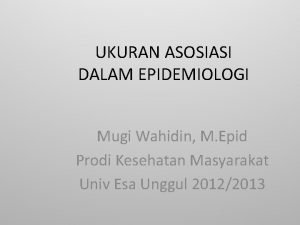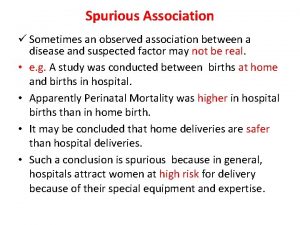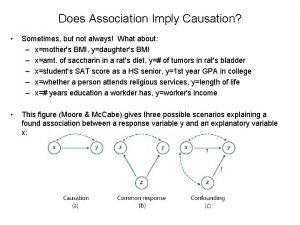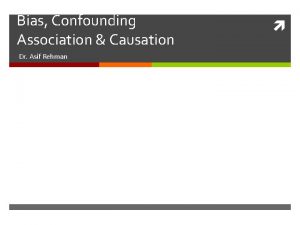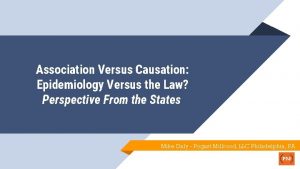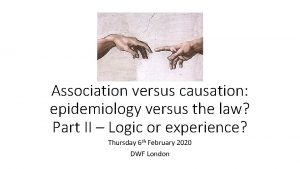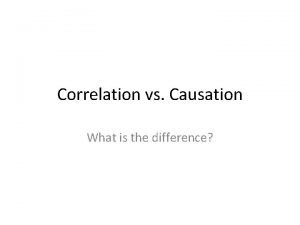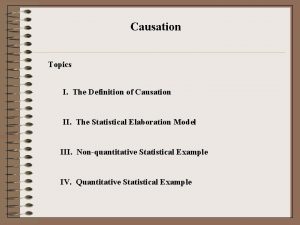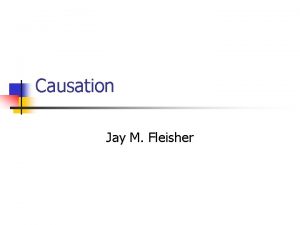Association versus causation epidemiology versus the law 11






- Slides: 6

Association versus causation: epidemiology versus the law? 11 th July 2019 Wadham College, Oxford

Programme - morning • 9. 45 – 10. 15 • 10. 30 Registration Chairman’s opening remarks • 10. 40 Session 1 – Basics and sources • 11. 40 – 12. 00 • 12. 00 – 13. 00 Break Session 2 – Doubling the risk? • 13. 00 – 14. 00 Lunch ØMr Justice Stuart-Smith ØDr Niall Boyce, Psychiatry Editor of the Lancet ØProf. Jane Hutton, Professor of Medical Statistics, University of Warwick ØProf. Carl Heneghan , Professor of Evidence-Based Medicine, University of Oxford ØProf. Jane Stapleton, Master of Christ’s College, University of Cambridge ØCharles Feeny, Barrister

Programme - afternoon • 14. 00 – 15. 00 Session 3 – Other jurisdictions Ø Mike Daly, Partner, Pogust Millrood USA Ø Prof. Sandy Steel – University of Oxford • 15. 00 – 15. 20 – Break • 15. 20 – 16. 30 – Open session, debating the following propositions: 1) 2) 3) Because epidemiological studies are observational population studies, they should never be used as proof of causation in industrial legal cases. The Courts in England Wales should adopt a similar approach to that in the US of proof of general and specific causation, which amounts to a more appropriate use of epidemiological evidence. Doubling of Risk – a) b) If doubling of risk is proved on epidemiological evidence in relation to a specific risk factor, does it follow that the risk factor should be deemed a cause in the law of tort? If not, why not? Can causation by specific risk factor be proved, even though the epidemiological evidence would indicate a relative risk of less than 2? • 16. 30 – Drinks • 18. 30 – Supper King’s Arms

Speakers • Chaired by Mr Justice Stuart-Smith High Court Judge, Queen’s Bench Division • Dr Niall Boyce, Editor of The Lancet Psychiatry Niall trained in medicine at Oxford University, qualifying as a doctor in 2004, and later did specialist training in psychiatry on the University College London psychiatry rotation. He also has a Ph. D in neuroendocrinology from Kings College London. He joined The Lancet as a Senior Editor in 2010 before founding The Lancet Psychiatry in 2014. • Professor J L Hutton has published in theoretical and applied statistics for 35 years. She has provided expert witness reports on life expectancy and adverse effects of drugs in several jurisdictions. She has contributed to national guidelines on treatments for disease and ethics in medical research. go. warwick. ac. uk/jlhutton

Speakers… • Carl Heneghan is Professor of Evidence-Based Medicine at the University of Oxford, Director of the CEBM, and Editor in Chief of BMJ EBM. His work includes investigating the evidence base and advising governments on the regulatory requirements for drug and devices. He has worked with Panorama to examine the evidence for sports drinks and IVF 'Add-on' treatments, with channel 4 and the BMJ, he exposed problems with metal-hips; he is an advisor to the UK Gov’t APPG on the surgical mesh, and he represented his late father in the Heneghan v Manchester Dry Docks Ltd court case. He undertakes evidence-based projects in the public interest, regularly appearing in the media and is a founder of the All. Trials campaign. He is Director of the Centre for Evidence. Based Medicine (CEBM), which is dedicated to the practice, teaching and dissemination of highquality evidence for better healthcare, and he is an NIHR Senior Investigator • Professor Jane Stapleton has experience in UK, US and Australasian legal systems. She has been a consultant on a range of cases including Barker v Corus, Heneghan v Manchester Dry Docks, Zurich v IEG, BAI v Durham (“Trigger”), Carder v Univ. of Exeter, A v National Blood Authority, Greenway/Dryden et al v Johnson Matthey as well as litigation involving Vioxx (rofecoxib), Sabril (vigabatrin), Epilim (sodium valproate), Atomic Veterans, Dow Corning’s breast implant bankruptcy, Merrill Lynch v Enron. She is Master of Christ’s College, Cambridge.

Speakers… • Charles Feeny is a Barrister, Legal Analyst and CEDR accredited Mediator. Charles has been acknowledged as a leading specialist in his practice fields of Industrial Disease, Clinical Negligence and Personal Injury for many years. He has achieved the highest ratings in legal directories including the status of star individual in Chambers UK Directory. Charles has appeared in over 50 reported cases and has been at the cutting edge of litigation in his specialist fields for nearly two decades. • Mike Daly is a partner at the mass tort and complex litigation firm Pogust Millrood, LLC. At Pogust Millrood, Mike represents individuals throughout the country in class action and mass tort claims involving consumer fraud, environmental harm, defective medical devices, and harmful pharmaceuticals. Currently, Mike serves as: lead counsel in the Injectafer pharmaceutical lawsuits (Philadelphia); bellwether trial counsel in the In re Zofran birth defect pharmaceutical litigation (Massachusetts); and has also been appointed to the Plaintiffs’ Executive Committee (PEC) for the In re Ethicon Physiomesh and Proceed Hernia Mesh litigations (New Jersey), and the Plaintiffs’ Steering Committee (PSC) for the In re Bard Hernia Mesh litigation (Rhode Island). • Professor Sandy Steel Sandy is Associate Professor and Fellow in Law at Wadham College. One of his books - Proof of Causation in Tort Law (Cambridge University Press, 2015) - is concerned with how legal systems ought to understand the requirement of proof of causation and when they ought to make exceptions to the requirement.



